
As I re-stained my wooden deck yesterday, I listened to podcasts about book publishing. A perennial trend is “chick lit”–the print counterpart to “chick flicks.” My first thought was that Emilie Loring’s newly re-issued novels could benefit.
My second thought was that I have never in my life considered Emilie Loring’s novels as “chick lit.” What does that even mean?!
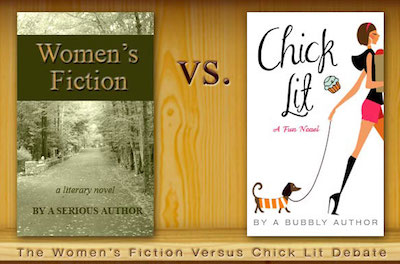
Calling them “lit” and “flick,” instead of literature and film, sounds ultra-casual, not something to be taken seriously. And “chick?” I remember preening when an older boy called me a “cute chick” one time, but I was twelve years old. I think we can now safely eliminate the term from “forms of address likely to elicit a positive reaction.”
Broadly, chick lit and chick flicks are simply stories in which a girl or woman is a main protagonist, especially stories of love and romance. In practice, they tend to be pleasant stories, the type that are advertised as “romantic comedies,” their complimentary name. Maybe we have some favorites in common: Legally Blonde, Notting Hill, Miss Congeniality, The Holiday, 27 Dresses, The Proposal, How to Lose a Guy in 10 Days, Pretty Woman, Bridget Jones’s Diary, The Princess Diaries…
I have favorites from a generation earlier, too: The Philadelphia Story (Katharine Hepburn, Cary Grant, Jimmy Stewart), Desk Set (Katharine Hepburn, Spencer Tracy), It Happened One Night (Claudette Colbert, Clark Gable), My Favorite Wife (Irene Dunne, Cary Grant) and Roman Holiday (Audrey Hepburn, Gregory Peck). If you haven’t seen these, seriously, go find them.
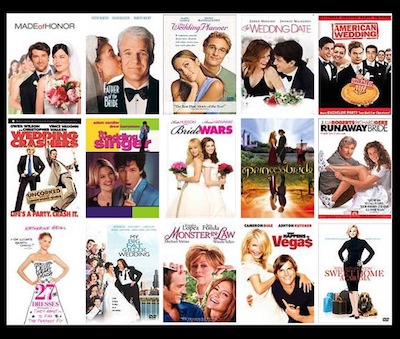
Gloria Steinem observed that there is a thread of commonality in chick-flicks, but it is not the fact of having women protagonists or women authors.
A “chick flick” is one that has more dialogue than car chases, more relationships than special effects, and whose suspense comes more from how people live than from how they get killed.
This definition clearly applies to Emilie Loring’s books. Dialogues advance her stories, and the conflicts, although set in rare environments, are relatable–balancing relationship with independence, adjusting to reduced circumstances, handling jealousy and betrayal, striving to make good, grieving loss, and learning to trust.
Her stories connect with people. This 1941 New York Times advertisement hits it right on the head:
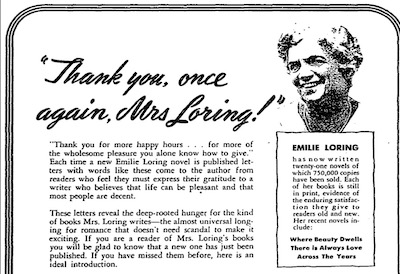
Each time a new Emilie Loring novel is published, letters with words like these come to the author from readers who feel they must express their gratitude to a writer who believes that life can be pleasant and that most people are decent. These letters reveal the deep-rooted hunger for the kind of books Mrs. Loring writes…”
These qualities give Emilie Loring’s novels staying power. The Solitary Horseman was a best-seller when it first appeared in 1928 and again in the 1960s. Lighted Windows has had nineteen editions since its first publication in 1930, and Emilie Loring’s books, in total, have sold many millions of copies.
“Chick” is a huge genre, in books and in film. So why the dismissive labels? People love these stories; why treat them as “guilty pleasures?”
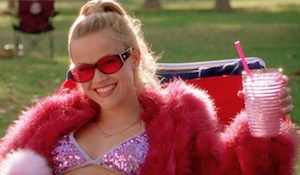
There’s no getting around the power dynamic of failing to take women’s stories and women writers seriously. Emilie and her writing friends dealt with this like Elle Woods did in Legally Blonde. When their books were compared to flapper entertainments, they proudly dubbed themselves “Flappers Row” and sat at the front of the room at Boston Authors Club meetings.
Some of the criticism is pure snobbery. We have haute cuisine, high fashion, and highbrow literature. Sometimes, the distinction is between “commercial fiction” and “literary fiction.” I find that amusing in a business that lives for blockbusters and measures success in sales. So commercial is better, right? 😉

Popular literature can be dismissed as “escapist,” which is also perplexing. We are always in a made-up world when we read a book! We are no more in 1930s California when we read The Grapes of Wrath than we are at the Cape with Pamela Leigh in Fair Tomorrow. Words on the page make pictures in our minds, and that’s really the deal. It’s all an escape.
“…during the major part of each day I exist in the world I am creating. Why spend all that time in a sordid environment? I like charming surroundings.” Emilie Loring
But shouldn’t a work of literature challenge our assumptions, invite reflection, widen our perspectives, teach us something important about our existence in the world? Can an entertaining book be “serious” literature? Of course it can.
“I write of the ideals and ideas, hopes and fears, joys and sorrows, ambitions and failures, the loves and hates of persons whom I understand. The fact that they wear up-to-the-minute clothes, live in charming houses, serve tea in colorful gardens, own cars and sometimes spectacular jewels does not make them less vulnerable to mistakes and despair…” Emilie Loring
Sometimes, “serious” goes too far. A recent essay in the Huffington Post said that serious fiction should provide “an unflinchingly honest, insightful eye toward the unpleasantness of reality.” I can’t for the life of me think of why literature should limit its aims to unpleasantness. What’s real about that?
“The beautiful things of life are as real as the ugly things of life…
“Not that I want to preach, I have a horror of that, but a story like a life should be built upon the firm foundation of a worthwhile belief and that happens to be mine.”
Emilie Loring
Surely, a pleasant story can be as consequential and genuine as a grim, humorless one, and aren’t we all looking for happy endings, in books and in life?
“Be honest, have you ever known gloom or depression to solve a problem? Problems aren’t solved that way. Instead it settles over one’s spirit like a fog and that fog attracts more fog and there you are in the middle of it groping for a way out, but if, instead, you keep in the sunlight of courage, even if a gale of misfortune blows you off your feet and whirls you along, at least you will have the thrill of seeing where you are going while you ride it.” Give Me One Summer

Maybe this speaks to assumptions about the characters of readers. Do they need to be awakened to the world around them?
“Do you know how I think of you? As a patch of hard-caked earth which needs a tremendous stirring before it will produce anything worth while.” Gay Courage
Are they ingenues, setting their personal compasses for the lifetime journey ahead?
“In God’s name what is life? A merry-go-round of excitement and adventure, luxurious homes and smart clothes? Or is it building character and struggling forward to one’s ideal?” There Is Always Love
Do they already struggle with all-too serious issues in their lives and need a beacon to light their way, hope to drive them forward?
“I want to write the kind of story—it will be just as much a part of the real world—that will cause persons who see ‘Melissa Barclay’ on a cover to plump down their problems—and incidentally the price—and seize the book. If, when they reach ‘the end’ they forget to go back for their problems and march blithely toward the day’s work pepped up and refreshed, refreshed—it’s a great word, isn’t it—I shall feel that I have achieved something.”
Emilie Loring
When a story causes us to suspend our disbelief, follow where it leads, and participate as we go, it has succeeded.
“It’s so hard to write a convincing love story. And it’s almost impossible to write with such grace and wit that readers feel like they’re floating downstream on an inner tube until the very last page.”
Rainbow Rowell, quoted in LuAnn Schindler’s “Blame it on the Book Cover,” here.
What we experience on that journey is the reason there is room for all kinds of books in our reading lives. No guilt, no guilty pleasures.
“A book is well-written, or it isn’t. It speaks to you, or it doesn’t. If it doesn’t, you should read something else!” Claire Cook
Chick lit? Flapper entertainments? Literature? I’m in!
Get out and enjoy those happy, summer books and summer movies, and tuck an Emilie Loring book into your tote bag on your way to the beach!
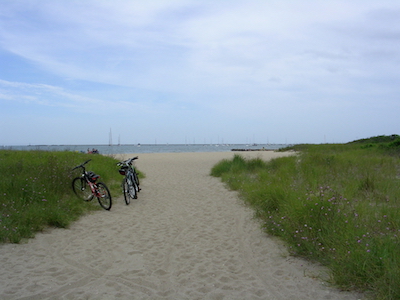
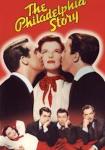
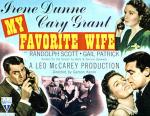
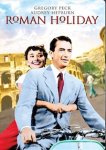
I like chick lit books. The good ones are like a younger branch of women’s fiction which has humor added. You have many movies listed I’ve seen so many times. “C. K. Dexter Haaaaven.”
LikeLiked by 2 people
😊 I like them, too, but I wish the distinction would disappear or be renamed. I fear they’ve been labeled the “junk food” of books, yet many are demonstrably “nutritious!”
LikeLiked by 1 person
I don’t use that term hardly at all any more.
LikeLiked by 1 person
Do you know a good alternative for that range in the continuum of books? I struggle trying to describe Emilie’s books to people who haven’t read them. The known labels miss the mark by too much, and yet I have the need to describe them in a concise and readily understood way.
LikeLike
I don’t know about chick lit…LOL but they are eternal, that’s for sure. I love your selection of movies, even if I’m not much of a movie watcher I’ve seen most of them. High Society was another favorite. Modern movies, The Holiday (Cameron Diaz and Kate Winslet) is a definite favorite “chick flick”.
I have a curious question, you say FIVE books are now on kindle…I have four…what is the fifth one? A key to many doors, To love and honor, Fair Tomorrow, and The Shining Years. I’ve searched and searched and can’t locate a fifth one. Help!
LikeLiked by 2 people
I debated about including it, because it wasn’t produced by the Loring family, but if you check Amazon, you’ll see that The Trail of Conflict is available in an e-version.
I have a bunch of these movies on both VHS and DVD… Some are rarely shown on movie channels, especially My Favorite Wife. High Society was a remake of The Philadelphia Story!
LikeLike
OH! And it’s under Baker Loring. I’m with you. Whew. Yes! it is a remake and I adore both!
LikeLiked by 1 person
This post has given me the urge to spend an evening watching happy movies… must resist, must resist… so much on my to-do list just now!
LikeLike
Well said, Patti!
LikeLiked by 2 people
Thanks!
LikeLike
Summertime for me is an hour and a half of reading an Emilie Loring book every afternoon. I decided to start with the first book and read them in order. They never get old! It’s a good life! Another wonderful classic movie is HOLIDAY.
LikeLiked by 1 person
I agree; they never get old. I need to re-watch “Holiday.” Cary Grant and Katharine Hepburn are favorites!
LikeLike